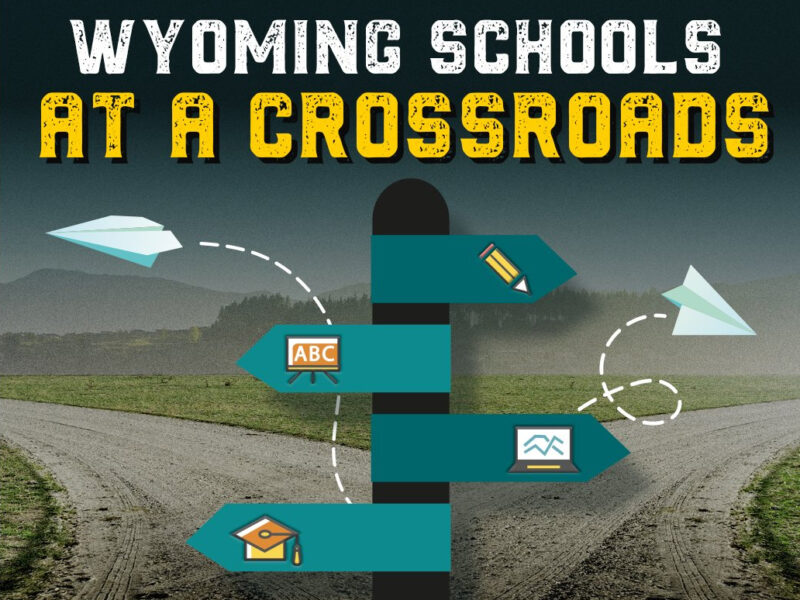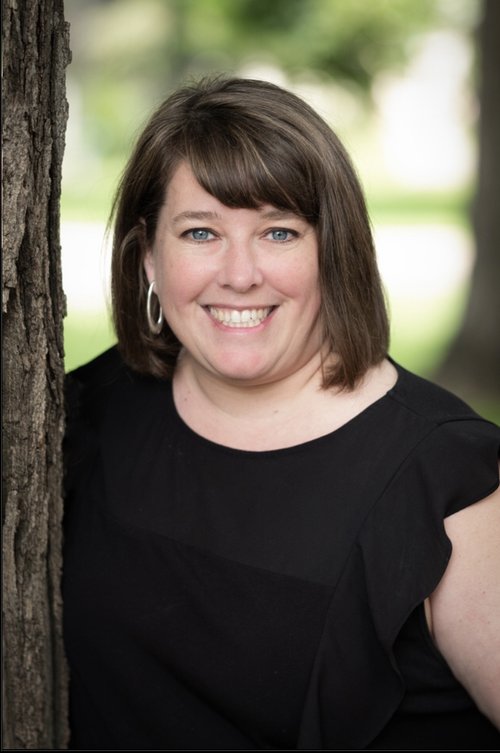WYOMING SCHOOLS AT A CROSSROADS: Cows on the Playground, Horses in the Classroom—Rural Teacher Corps Builds Pipeline
New program aims to connect college students with mentors to staff schools in rural communities
- Published In: Other News & Features
- Last Updated: Oct 05, 2022

By Elizabeth Sampson
Special to the Wyoming Truth
Certain experiences only happen to rural schoolteachers.
When Brooke Johnson, 35, taught at Slack Elementary, a one-room schoolhouse in Parkman, near Ranchester, a goat who lived next door often stood on the school’s porch and peered through the window, waiting for recess when the children would come out and play. Other times, Johnson and her students chased neighborhood cattle off the playground and back into their pasture before they could play hide and seek.

During a math unit on weights and measures, one of Johnson’s students told her he was raising a 4-H dairy heifer and had to keep track of her weight. So Johnson took her students to the boy’s house to learn how the family used a large scale to weigh their cattle.
Experiences like these, along with the opportunity to get to know her students and their families, are what Johnson loves about teaching in a rural setting. At Slack, she taught kindergarteners through fourth graders—between five and 11 students depending on the year. Today, she teaches math intervention at Tongue River Elementary and Tongue River Middle School in Ranchester, population 1,062.
“I can’t imagine teaching in a big city where you don’t know your families,” Johnson said. “I’m sure the teachers know their students as well as they possibly can, but it just means a lot to be able to know their families, know their grandparents, know their cousins—just really know where they are coming from so you can teach them in a way that is meaningful . . . I just think that is priceless.”
Recruiting future rural teachers
All of Wyoming is facing a teacher shortage, but hiring educators who want to make a career in the state’s rural schools can be extra challenging. There are fewer student-teaching openings in rural areas, housing can be difficult to access and relocating to a small community as an outsider can be daunting.

That’s where the Rural Teacher Corps comes in. The new organization supports college education majors who are interested in teaching in a rural school by connecting them with current rural educator mentors and helping them attain skills that are relevant to living and working in those communities. College students who participate in the program will receive a $1,500 for the pilot 2022-23 school year.
“There’s a shortage of teachers nationwide and especially in rural areas, where not having one teacher can make or break if a student can get a foreign language credit or a science credit in order to be able to graduate,” said Leslie Cook, head of professional learning at the Teacher Learning Center of the Teton Science Schools.
Cook is joined by Alison Mercier, University of Wyoming Assistant Professor of Elementary Science Education, in recruiting the first cohort of eight sophomores and juniors from UW. Additionally, the program will develop relationships with mentor teachers in rural schools near Laramie and statewide.
The Rural Teacher Corps is supported with funding from the dean’s office at UW’s College of Education and the George B. Storer Foundation, a Jackson-based nonprofit that supports early childhood education. Cook and Mercier declined to specify the amount.
“We would like members of the Rural Teacher Corps to be able to complete their practicum experiences and have student teaching placements in rural schools…hopefully with these teachers that we bring in as mentor teachers . . . ,” Mercier said.
Rural Teacher Corps will coach future teachers on how to meet challenges
As a teacher in a rural community, Johnson faces unique challenges. Practical issues, like not being able to run to Walmart if she needs supplies for a project the next day, mean she always has to plan ahead.
Sheryl Epp, 56, who teaches 14 students in pre-kindergarten through third grade at Crowheart Elementary in Fremont County, has spent 11 years in a one-room schoolhouse. She, too, enjoys working with supportive families and leveraging the rural setting in an instructional capacity. Case in point: Epp’s students have brought their horses to school for show and tell.
Still, the physical isolation can impact curriculum delivery in real time. “If a kid has an academic struggle that puzzles me and I want to bounce it off somebody else or ask their advice, I don’t have that on a daily basis,” Epp said, noting she can email or call other teachers in the district, but those conversations aren’t always readily available.

She added: “[I’ve] got to think on [my] feet, because I’m it. Day to day stuff, I’m the secretary, I’m the nurse, I’m the principal, I’m the maintenance [worker] if something breaks. You have to be someone who is OK with the isolation.”
It’s also not easy for teachers who relocate to small communities to figure out how to fit in. One solution, Mercier said, is to host family nights at school or community events that are linked to what the children are learning in the classroom. To that end, program organizers will collaborate with rural schools this year so aspiring teachers can learn how to make those important connections.
“We’re hoping to model for our [aspiring] teachers and the members of the Rural Teacher Corps different ways of understanding the needs and the concerns of your community. . .,” she said.
By shadowing rural teachers and interviewing them about their experiences, Rural Teacher Corps participants will receive firsthand training on place-based learning—a pillar of the program. Cook described that approach as connecting learning and community, which enables students to experience their world and change it for the better.
Epp is a strong proponent of place-based learning. Currently, she is leading her students through a unit about water. Not only are her students reading and writing about water, but they also are learning how valuable and rare water can be in their own western communities. On a recent field trip, for example, they tested the water in a nearby creek and hiked up to a glacier that feeds the local streams and lakes.
The Rural Teacher Corps also will address the misconception that small communities don’t have much to offer, according to Cook.
“So much of the common narrative around rural places for students is you have to leave those places to find success and to find a career,” she said. “I think the message of having a Rural Teacher Corps and encouraging folks to teach in rural schools, helps to create stronger, more vibrant, more equitable rural places.”
Long-term objectives for the program include promoting positive mental health, especially for teachers in communities that may lack mental health care, and career-long support.
“Our goals don’t stop with taking this job in this rural school, but there’s longevity to be considered,” Mercier said. “How can we help our students develop and maintain the tools that they need to not only enter into these places, but also to thrive in them through their beginning teacher years and hopefully into a thriving long career?”
Mentor teachers will help participants understand what teaching in a rural school is really like.
“I think it’s nothing to be scared of,” Johnson said. “Once you try it out in a rural community you will just fall in love with it.”
Even if that means chasing cows off the playground.
The deadline for UW education majors to apply for the Rural Teacher Corps is Oct. 28. Rural teachers who are interested in becoming mentor teachers should email Mercier at amercier@uwyo.edu or Cook at leslie.cook@tetonscience.org.













